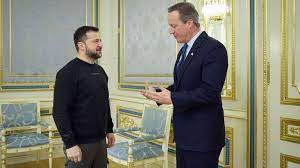UK: David Cameron makes first official visit to Ukraine

London: New Foreign Secretary David Cameron has made his first working visit to Ukraine, meeting President Volodymyr Zelensky in Kyiv.
Lord Cameron reiterated the UK’s support for Ukraine, promising moral, diplomatic and “above all military support for… however long it takes”.
Mr Zelensky congratulated Mr Cameron on his new post and thanked him for the UK’s continued backing.
Lord Cameron became foreign secretary in a cabinet shuffle on Monday.
“This is very important, especially now, when the world is paying attention not only to the situation on the battlefield in Ukraine, and dividing the focus really does not help,” the Ukrainian president said, alluding to the Middle East.
“We are grateful for the unwavering support of Ukraine from the United Kingdom. We are grateful for the warm welcome of Ukrainian citizens in the UK. And we are glad that you came to Ukraine,” he said.
Mr Zelensky posted a short clip of the meeting to social media, during which Lord Cameron can be heard saying “I wanted this to be my first visit.”
“What I want to say by being here is that we will continue to give you the moral support, the diplomatic support and the economic support and above all the military support that you need not just this year and next year but however long as it takes,” Lord Cameron said.
The former UK prime minister added: “I’ve had some disagreements with Boris Johnson, we’ve known each other for 40 years, but his support for you was the finest thing he and his government did.”
Ukraine’s foreign ministry said the pair discussed weapons, arms production, and security in the Black Sea.
In a statement following the meeting, Lord Cameron said: “As winter approaches, we continue to stand with the Ukrainian people as they resist Putin’s illegal invasion. In the last three months, they have pushed Russia back in the Black Sea and are opening vital sea trade routes for the Ukrainian economy and global food supplies.”
Lord Cameron left Ukraine on Thursday afternoon.
The UK has provided Ukraine with billions of pounds in military aid since Russia launched its invasion in February 2022.
Military hardware donations have included a number of Challenger 2 tanks and long-range missiles, and tens of thousands of Ukrainian recruits have been trained by the British military on UK soil.
Lord Cameron’s visit comes after Ukrainian forces succeeded in establishing positions across the Dnipro river in southern Ukraine, a potentially significant advance. Local Russian-installed officials acknowledged on Wednesday that Ukrainian forces were present in the village of Krynky, on the Russian-occupied left (east) bank.
The river has separated Ukrainian and Russian forces since Moscow’s troops withdrew from Kherson a year ago.
The news has heartened Ukrainians, whose four-month-old counter-offensive has failed to regain significant occupied territory from Russia.
Lord Cameron’s new post marks his return to the cabinet table for the first time in more than seven years.
He has replaced James Cleverly, who was moved to be home secretary to take over from Suella Braverman in a dramatical overhaul of Rishi Sunak’s cabinet on Monday.
Lord Cameron was prime minister from 2010 to 2016, resigning after the UK voted to leave the EU as he had backed the Remain campaign.
In the time since, Lord Cameron has occupied himself with various business endeavours, charity work, teaching and speaking engagements.
There has been some controversy about Lord Cameron’s return to the cabinet, since he is no longer an elected MP and will sit as a peer rather than in the Commons.
Opposition parties and Speaker Sir Lindsay Hoyle have raised concerns about how MPs will be able to hold Lord Cameron to account, given he will not be in the Commons chamber to take questions during the regular departmental scrutiny sessions.
Instead, those questions will be fielded by the ministers below him at the Foreign Office, including Andrew Mitchell and Anne-Marie Trevelyan. It is not uncommon for deputies to answer for the department, although this normally occurs if the foreign secretary is on diplomatic visits around the world.





